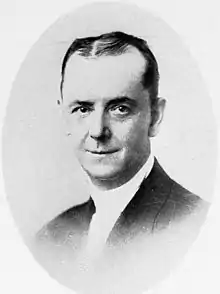Frontier Marshal (1939 film)
Frontier Marshal is a 1939 American Western film directed by Allan Dwan and starring Randolph Scott as Wyatt Earp. The film is the second produced by Sol M. Wurtzel based on Stuart N. Lake's biography of Earp Wyatt Earp: Frontier Marshal (later found to be largely fictionalized). An earlier version was Wurtzel's Frontier Marshal, filmed in 1934. The film was remade by John Ford in 1946 as My Darling Clementine, including whole scenes reshot from the 1939 film.
| Frontier Marshal | |
|---|---|
 Theatrical release poster | |
| Directed by | Allan Dwan |
| Screenplay by | Sam Hellman |
| Based on | Wyatt Earp: Frontier Marshal 1931 novel by Stuart N. Lake |
| Produced by | Sol M. Wurtzel |
| Starring | Randolph Scott Nancy Kelly |
| Cinematography | Charles G. Clarke |
| Edited by | Fred Allen |
| Color process | Black and white |
Production company | 20th Century Fox |
| Distributed by | 20th Century Fox |
Release date |
|
Running time | 71 minutes |
| Country | United States |
| Language | English |
Frontier Marshal costars Nancy Kelly, Cesar Romero as "Doc Halliday" (the name was changed for the film from the original "Holliday" because of fear of a lawsuit from Holliday's family), John Carradine and Lon Chaney Jr. Ward Bond appears as the town marshal; Bond was also in the 1934 version, and later appears as Morgan Earp in Ford's film. Eddie Foy Jr. plays the large supporting role of his father, entertainer Eddie Foy, in this as well as three other feature films.
Plot
In Tombstone, Arizona, the sheriff is unwilling to stop Indian Charlie from shooting up the saloon owned by Ben Carter, so new arrival Wyatt Earp does. Earp is beaten by some of Carter's hired men for taking the law into his own hands.
Dance hall girl Jerry is upset with Earp, so when her sweetheart Doc Halliday gets to town, a showdown seems imminent. Earp and Doc instead become friends. Earp takes over as the lawman in town and also tries to convince Doc's former sweetheart Sarah Allen that their relationship can still work out.
The two men work together after visiting entertainer Eddie Foy is kidnapped, and also when Jerry joins forces with Carter to plan the robbery of a gold shipment. Doc is forced to perform surgery to save a life, then is shot in the back by Carter. Earp avenges his friend's death and Jerry leaves.
Cast
- Randolph Scott as Wyatt Earp
- Nancy Kelly as Sarah Allen
- Cesar Romero as Doc Holliday
- Binnie Barnes as Jerry
- John Carradine as Ben Carter
- Edward Norris as Dan Blackmore
- Eddie Foy Jr. as Eddie Foy
- Ward Bond as Town Marshal
- Lon Chaney Jr. as Pringle
- Chris-Pin Martin as Pete
- Joe Sawyer as Curley Bill
- Dell Henderson as Dave Hall
- Harry Hayden as Mayor Henderson
- Ventura Ybarra as Pablo
- Charles Stevens as Indian Charlie
- Tom Tyler as Buck Newton (uncredited)
Origins
The film was based on Stuart Lake's book Wyatt Earp: Frontier Marshal, published two years after Earp's death in 1929. Prior to his death, Earp and his wife Josephine ("Sadie") went to great lengths to keep Josephine's name out of the book, and she threatened litigation to prevent her name from being used in the film.[1]: 101 In 1934, she had successfully forced the producers to excise her husband's name from the first film. In 1939, she sued 20th Century Fox for $50,000 to prevent it from producing the remake of Frontier Marshal. After agreeing to remove Wyatt Earp's name from the title and settling with Josephine Earp for $5,000,[2] Fox released the film as Frontier Marshal.[3]
In Los Angeles, Josephine Earp befriended many celebrities, including Cecil B. DeMille and Gary Cooper. She received part of the money earned by sales of Lake's book about her husband as well as royalties from the film.[3]
References
- Rosa, Joseph G. (1979) [1969]. The Gunfighter: Man or Myth? (illustrated, revised ed.). Norman: University of Oklahoma Press. ISBN 978-0-8061-1561-0. LCCN 68-31378.
- Faragher, John Mack (1996). Carnes, Marck C. (ed.). Past Imperfect: History According to the Movies.
{{cite book}}:|work=ignored (help) - Hutton, Paul (Summer 1995). "Showdown at the Hollywood Corral, Wyatt Earp and the Movies". Montana: The Magazine of Western History. 45 (3): 2–31.
